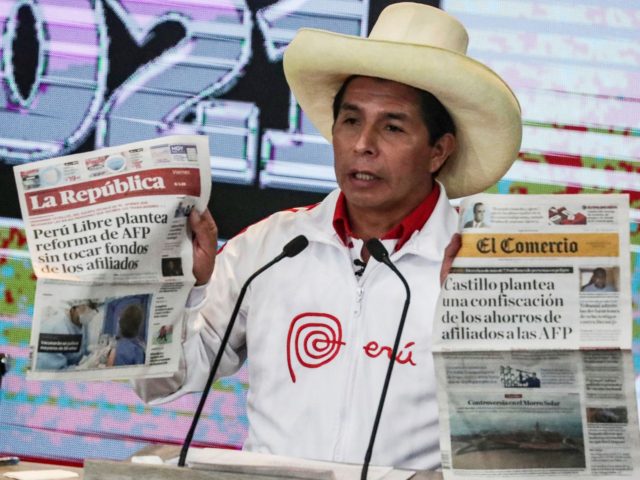Radical leftist Pedro Castillo and hardline conservative Keiko Fujimori are stuck in a statistical tie less than a week before Peru’s June 6 presidential elections, polls showed on Monday.
Castillo, of the Marxist Free Peru party, and Fujimori, of the right-wing Popular Force party, are facing off a second time after no candidate succeeded in receiving over 51 percent of the vote in the first round of the presidential election in April. At the time, Castillo handily defeated Fujimori 18.5 percent to 14.5 percent of the vote, but Fujimori received more votes than any other candidate, guaranteeing a spot in the run-off.
The Argentine news portal Infobae noted that two polls published this weekend found the difference in voter intention between the two candidates within their margins of error, meaning they are essentially tied. Peru maintains a compulsory voting system, which means citizens cannot abstain from voting, though they can cast blank ballots if they do not support either candidate.
One poll by the firm Ipsos, taken nationwide on May 28, found Castillo with 51.1 percent of the intended voter support on June 6 compared to 48.9 for Fujimori. The poll has a 2.5 percent margin of error and 20 percent of those surveyed said they were still undecided, leaving the race wide open.
Another poll cited by Infobae, by the Peruvian Studies Institute (IEP), taken on the 27th and 28th of May found Castillo in the lead with 40.3 percent to Fujimori’s 38.3 percent. The poll differed significantly from the Ipsos study in that it only found 6.3 percent of voters undecided. Its margin of error, at 2.8 percent, was similar to the Ipsos poll. The trend in the IEP poll, published by the newspaper La República, heavily favored Fujimori. Castillo’s support dropped about four percentage points, about the same amount Fujimori’s rose between May 23, when the IEP conducted its last poll, and May 27.
Both candidates have raised concerns on either side of the aisle regarding their ideologies and commitment to democracy. Castillo’s Free Peru boasts an openly Leninist party platform, praising the communist leader for his opposition to freedom of the press, according to snippets published by El Comercio, a Peruvian newspaper. Castillo’s running mate also caused an uproar following his victory in April by declaring that, in the event that her ticket won, “the comfortable Lima middle class will surely cease to be a comfortable middle class.”
Castillo has attempted to distance himself from his own party’s platform but has personally prompted concerns due to accusations that he has political ties to Shining Path, a Marxist terrorist organization thought defunct in the mid-1990s before authorities identified it as responsible for a civilian massacre last week.
Fujimori has raised concerns not for her own statements or actions, but her father’s. Former President Alberto Fujimori, who a teenaged Keiko served as first lady following her mother Susana Higuchi’s divorce from and presidential campaign against her father, is currently serving a 25-year prison sentence for alleged human rights abuses during his tenure in the 1990s. The elder Fujimori is considered largely responsible for the eradication of the Shining Path and arrest of its leader, Abimael Guzmán, who remains in prison serving a life sentence today.
Keiko Fujimori, on her third runoff presidential race, has striven to distance herself from left-wing accusations of being anti-democratic. She most prominently made this attempt on Monday at a bizarre event alongside socialist Venezuelan activist Leopoldo López and Nobel Prize-winning writer Mario Vargas Llosa, apologizing for the alleged mistakes her father made decades ago. Vargas Llosa was once one of Alberto Fujimori’s staunchest critics and unsuccessfully ran against him for president in 1990.
Castillo addressed concerns about his own ties to authoritarians during a debate against Fujimori on Sunday, the last one before the election. Castillo described concerns that he would implement socialist policies like nationalizing businesses as an outright “lie.”
“It is a lie what they say that they will shut down your shop, that we are going to take bread from you, that we will close the doors, that we will seize your house, that we will seize your property,” Castillo said.
Castillo also proposed a substantial government investment in healthcare infrastructure to combat the Chinese coronavirus pandemic, to which Fujimori responded that the Free Peru party had failed to complete every single one of its proposed hospitals in Junín, the region once governed by the founder of Free Peru, Vladimir Cerrón. Castillo reportedly rebutted by attacking Alberto Fujimori for never declaring health a “human right.”
Castillo refused to debate Fujimori for weeks before finally agreeing to in mid-May and failing to appear at the venue.
Both Castillo and Fujimori are currently facing police investigations. The Lima Public Ministry announced in May that it was investigating evidence that Castillo had failed to declare a lucrative job running an investment business in his election paperwork. Fujimori is out on bail on an investigation into accusations that she took bribes from the notoriously corrupt Brazilian contracting firm Odebrecht.
Follow Frances Martel on Facebook and Twitter.

COMMENTS
Please let us know if you're having issues with commenting.